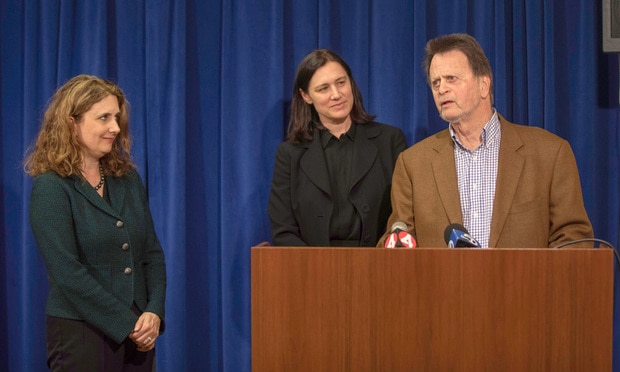
By Amanda Bronstad – Ther Recorder, 27 March 2019 | Source
After one day of deliberations, jurors in San Francisco found that Monsanto, now owned by Bayer AG, was liable for plaintiff Edwin Hardeman’s non-Hodgkin lymphoma. The award includes $75 million in punitive damages.
A federal jury hit Monsanto with a verdict of more than $80 million Wednesday after finding the company liable for a man’s cancer caused by its Roundup herbicide.
After one day of deliberations, six jurors in San Francisco unanimously found that Monsanto, now owned by Bayer AG, was liable for plaintiff Edwin Hardeman’s non-Hodgkin lymphoma. The award includes $75 million in punitive damages for Hardeman, who alleged he was diagnosed with the blood cancer after two decades of using Roundup to kill weeds on his 56-acre property in Sonoma County.
Hardeman’s lead trial attorneys, Aimee Wagstaff, of Andrus Wagstaff in Lakewood, Colorado, and Jennifer A. Moore, of the Moore Law Group in Louisville, Kentucky, said their client was pleased with the verdict.
“As demonstrated throughout trial, since Roundup’s inception over 40 years ago, Monsanto refuses to act responsibly,” they wrote in a statement following the verdict. “It is clear from Monsanto’s actions that it does not care whether Roundup causes cancer, focusing instead on manipulating public opinion and undermining anyone who raises genuine and legitimate concerns about Roundup. It speaks volumes that not one Monsanto employee, past or present, came live to trial to defend Roundup’s safety or Monsanto’s actions. Today, the jury resoundingly held Monsanto accountable for its 40 years of corporate malfeasance and sent a message to Monsanto that it needs to change the way it does business.”
Bayer said it planned to appeal.
“We are disappointed with the jury’s decision, but this verdict does not change the weight of over four decades of extensive science and the conclusions of regulators worldwide that support the safety of our glyphosate-based herbicides and that they are not carcinogenic,” the company said in a statement. “The verdict in this trial has no impact on future cases and trials, as each one has its own factual and legal circumstances.”
The verdict is the second time that jurors have gone against Monsanto, which suffered a $289 million award last year in a case in San Francisco Superior Court. The judge in that case, however, slashed the award by more than $200 million. Another Roundup trial against Monsanto is scheduled to begin Thursday in Alameda County Superior Court.
The verdict caps the first bellwether trial from about 800 lawsuits coordinated in multidistrict litigation before U.S. District Judge Vince Chhabria of the Northern District of California. In a move favoring Monsanto, he bifurcated the first bellwether trial, forcing plaintiffs to prove that scientific evidence proved their allegations that Roundup causes cancer before moving to the question of Monsanto’s liability. Wednesday’s award ends the second of two phases of a trial that began Feb. 25.
In the first phase, jurors found that Roundup was a “substantial factor” in Hardeman’s cancer. In the second phase, the jury had to determine whether Roundup had a design defect, if Monsanto acted reasonably in selling and marketing Monsanto in light of the scientific evidence, and whether the product should have included a warning label during the time that Hardeman was using it.
In its statement, Bayer noted that the jury deliberated for four days in the first phase, which dealt with causation—“an indication that it was very likely divided over the scientific evidence.“ The company also noted skepticism Chhabria expressed pretrial about expert evidence on the science.
“The legal rulings under which the court admitted expert scientific testimony from the plaintiff that it called ‘shaky’ is one of several significant issues that the company may raise on appeal,“ the company wrote in its statement. “Monsanto moved to exclude this same evidence before trial.“
The verdict is a victory for Wagstaff, who got off to a rough start after Chhabria sanctioned her for what he called “obvious violations” of his pretrial orders during her opening statement in the first phase.
A team from Wilkinson Walsh + Eskovitz led by Brian Stekloff represented Monsanto.
Both sides had stipulated to about $200,000 in economic damages for Hardeman’s medical expenses, but the jury also awarded $5.6 million in past and future non-economic damages.
Jurors also found clear and convincing evidence that Monsanto was liable, adding punitive damages to the verdict. In closing arguments Tuesday, Moore urged jurors to send a “loud message” to Monsanto.
Photo: (L to R) Trial team Jennifer Moore of Moore Law Group and Aimee Wagstaffe of Andrus Wagstaff with plaintiff Edwin Hardeman after their $80 million verdict against Monsanto. (Photo: Jason Doiy/ALM)
